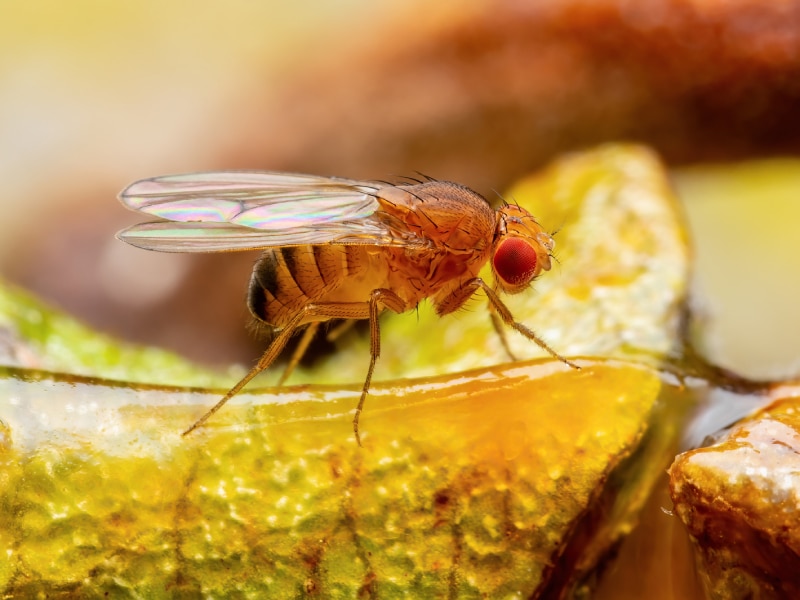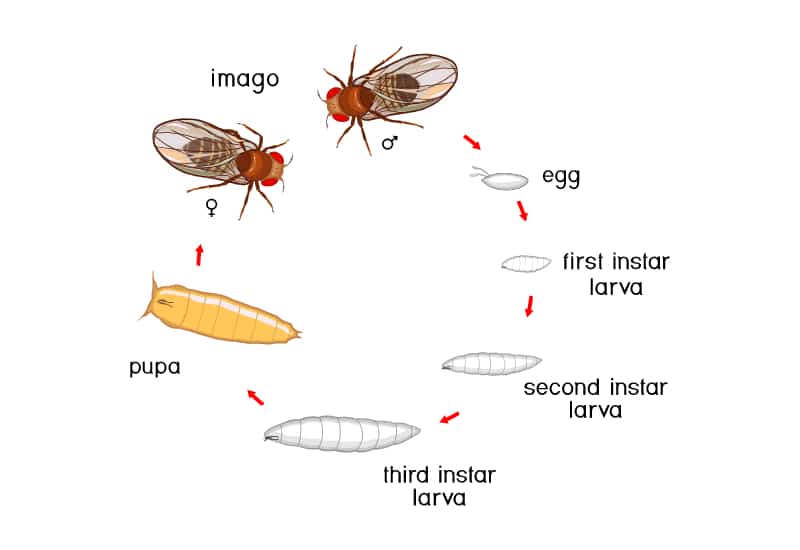
Fruit flies are more than just a nuisance in your grocery store—they’re offputting to customers and can carry bacteria and other organisms that can contaminate food. Although any grocery store can develop fruit flies, shoppers may associate them with unsanitary conditions and choose another store. Fortunately, you can take some simple steps to manage fruit flies in a grocery store.
What are fruit flies?
Fruit flies are winged insects that grow up to one-eighth of an inch and are typically tan and black with red eyes. Like other insects, they have segmented bodies and six legs. They are common throughout the U.S.
Where do fruit flies come from?
Fruit flies come into grocery stores from the outside, hitching a ride on produce shipments or entering through open doors or loading bays. They tend to seek moist areas with access to food and will often breed in garbage cans, mop buckets, recycling bins, and plumbing drains. In fact, they’re so small that they can even live inside damp cleaning rags.
Fruit fly life cycle
Fruit flies live for only 40 to 50 days and go through a four-stage cycle. They begin as eggs, typically on moist surfaces or near fermenting food. Larvae hatch from the eggs and eat whatever is nearby. Then, they reach the pupa stage before finally maturing into adults. The entire growth process from egg to adult typically takes about one week. Despite their short life spans, a female fruit fly can lay as many as 500 eggs, so a small infestation can quickly become a big one.
How do you get rid of fruit flies in a grocery store?
Getting rid of fruit flies in a grocery store is not a one-time thing—reducing the risk of recurring infestations requires ongoing effort. Follow these tips to remain vigilant:
Work with your suppliers
Fruit flies can get into your store through shipments of fresh produce, so it’s vital that your suppliers also focus on fruit fly prevention. Find out what pest control measures they take to protect outgoing shipments. Do they use professional pest control services to prevent fruit flies? Is the produce washed before being packaged and shipped?
Introduce protection for produce
When your store is not open, cover the fruit fly impact area with fine netting to make it harder for the insects to access it. In storage areas, refrigerate fresh produce whenever possible. If you don’t have space to keep it all chilled, try to cover produce waiting to go to the sales floor with netting at all times.
Check stock daily
The sooner you catch a fruit fly infestation, the better. Have your team inspect both produce displays and stock areas for pests. Look inside prepackaged produce to ensure that no flies are inside. Throw fruits and vegetables away when they show signs of spoilage to lower the likelihood of attracting these insects.
Take steps to keep flies out
Keep fruit flies outside where they belong. Implement policies that require your team to close doors in loading zones and employee-only areas. Use automatic double-sliding doors for customers to put an extra layer of protection between your store and pests. Hanging air and strip curtains in storage areas can make it harder for fruit flies to get through.
Adopt high cleaning standards
Rigorous cleaning standards are vital to fruit fly control. You should wipe down all surfaces in produce shopping areas, break rooms, and produce storage areas daily. Mop floors to remove dirt and debris. Have team members remove spoiled stems, leaves, and damaged produce daily from display and storage areas. Train staff to report leaky plumbing fixtures and have repairs made quickly to keep all parts of your store dry.
Deal with waste properly
Garbage cans and dumpsters can provide food and water for fruit flies, so all trash cans should remain covered when not used, and the lids on dumpsters should be closed. Empty the trash at least once per day, regardless of whether the cans are full. Seal bags tightly and double-bag anytime bulky or sharp objects are disposed of to prevent tears. Wash trash cans at least once a week or more if spills occur.
Contact a professional pest control company
Pest control prevention methods can make your grocery store less attractive to fruit flies. However, once an infestation begins, the best way to deal with it is to contact a professional pest control company with experience in the grocery, restaurant, and food service industries.
Does vinegar and sugar get rid of fruit flies?
The combination of vinegar, sugar, and dish soap is a common home remedy for fruit flies. The idea is that the vinegar and sugar will attract the flies, causing them to enter a bowl or other vessel. The dish soap changes the water’s surface tension, making it impossible for the flies to escape, which eventually drowns them.
In a home kitchen, vinegar and sugar may get rid of one or two fruit flies. However, the home remedy is unlikely to be effective in a commercial setting like a grocery store. Plus, deploying it would be difficult without inconveniencing customers or making it hard for stockers to work in storage areas.
How do you store fruit to avoid fruit flies?
The best way is to keep fruit out of reach in sealed containers or specially designed bins in refrigerators. However, this is only sometimes possible for grocery stores. As mentioned above, netting and air and strip curtains can limit fruit flies’ access to food.
Fruit fly pest control services
If you’ve spotted fruit flies in your grocery store, reach out to the experts at Hawx Pest Control. Our licensed pest control technicians can identify the fruit fly impact zone(s) and help address fruit fly infestations. In addition, they can share customized pest control tips for your business and get you on a maintenance schedule to significantly reduce the risk of future infestations.
Categories
RELATED POSTS






